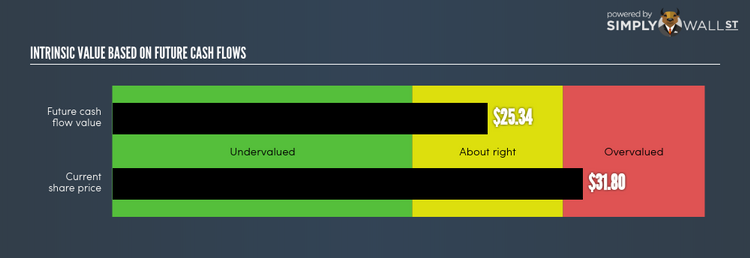Is BancorpSouth Bank (NYSE:BXS) Worth $31.8 Based On Intrinsic Value?

BXS operates in the banking industry, which has characteristics that make it unique compared to other sectors. Understanding these differences is crucial when it comes to putting a value on the bank stock. Banks, for example, must hold certain levels of tiered capital in order to maintain a safe cash cushion. Focusing on data points like book values, along with the return and cost of equity, may be useful for computing BXS’s intrinsic value. Today I will take you through how to value BXS in a relatively effective and simple approach. Check out our latest analysis for BancorpSouth Bank
What Model Should You Use?
There are two facets to consider: regulation and type of assets. Strict regulatory environment in United States’s finance industry reduces BXS’s financial flexibility. In addition to this, banks usually do not have significant amounts of tangible assets on their books. The Excess Returns model overcomes the required capital kept on hand and lack of tangibles by focusing on forecasting stable earnings, rather than less relevant factors such as depreciation and capex, which more traditional models focus on.
The Calculation
The main belief for this model is, the value of the company is how much money it can generate from its current level of equity capital, in excess of the cost of that capital. The returns above the cost of equity is known as excess returns:
Excess Return Per Share = (Stable Return On Equity – Cost Of Equity) (Book Value Of Equity Per Share)
= (10.84% – 9.83%) * $22.3 = $0.22
Excess Return Per Share is used to calculate the terminal value of BXS, which is how much the business is expected to continue to generate over the upcoming years, in perpetuity. This is a common component of discounted cash flow models:
Terminal Value Per Share = Excess Return Per Share / (Cost of Equity – Expected Growth Rate)
= $0.22 / (9.83% – 2.47%) = $3.04
These factors are combined to calculate the true value of BXS’s stock:
Value Per Share = Book Value of Equity Per Share + Terminal Value Per Share
= $22.3 + $3.04 = $25.34
Given BXS’s current share price of $31.8, BXS is , at this time, trading above what it’s actually worth. This means BXS isn’t an attractive buy right now. Pricing is only one aspect when you’re looking at whether to buy or sell BXS. Fundamental factors are key to determining if BXS fits with the rest of your portfolio holdings.
Next Steps:
For banks, there are three key aspects you should look at:
Financial health: Does it have a healthy balance sheet? Take a look at our free bank analysis with six simple checks on things like bad loans and customer deposits.
Future earnings: What does the market think of BXS going forward? Our analyst growth expectation chart helps visualize BXS’s growth potential over the upcoming years.
Dividends: Most people buy financial stocks for their healthy and stable dividends. Check out whether BXS is a dividend Rockstar with our historical and future dividend analysis.
For more details and sources, take a look at our full calculation on BXS here.
To help readers see pass the short term volatility of the financial market, we aim to bring you a long-term focused research analysis purely driven by fundamental data. Note that our analysis does not factor in the latest price sensitive company announcements.
The author is an independent contributor and at the time of publication had no position in the stocks mentioned.

